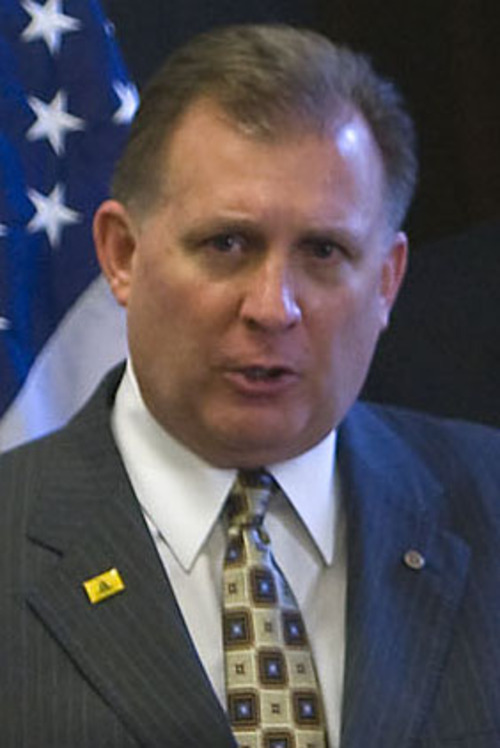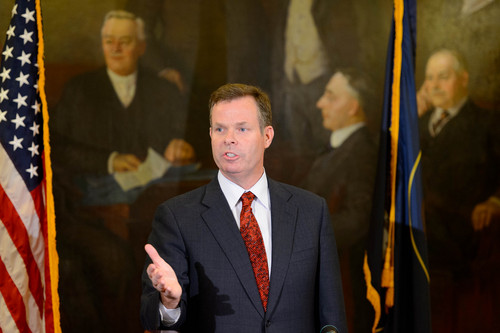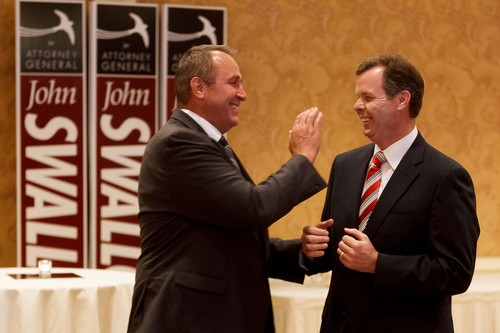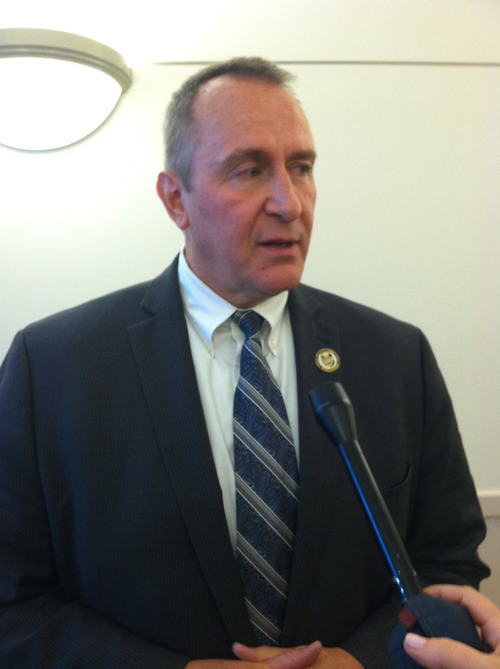This is an archived article that was published on sltrib.com in 2014, and information in the article may be outdated. It is provided only for personal research purposes and may not be reprinted.
In the aftermath of the massive political scandal that drove Attorney General John Swallow from office and could lead to criminal charges against him and his predecessor, Mark Shurtleff, a Utah senator is crafting legislation to clamp down on an industry that was among their leading donors.
Sen. Curt Bramble, R-Provo, is in the early stages of targeting business-opportunity enterprises (so-called "BizOps") and online marketers, which are multibillion-dollar industries in the state — but tarnished by high-profile crackdowns by regulators for deceptive business practices.
Bramble said he is looking at beefing up the regulatory law, making it "stricter in the sense of removing any loopholes, resolving any ambiguities and putting teeth in the statute for folks that violate it."
"We want a tougher regulatory environment for bad actors that would take advantage of unsuspecting citizens," he said.
Brett Tolman, a former U.S. attorney for Utah who now represents several companies in the industry, said state regulators already have enormous power when it comes to the field, but conceded some changes likely are needed and the industry wants to be involved in the talks.
"There are people who really want to do legitimate, honest business," Tolman said, "and, if Utah does this, the concern I have [is] if it gives too much power to the regulators, they're just going to say goodbye to an enormous cross section of potential business and economic development."
BizOps, coaching and mentoring companies typically run or contract with call centers, contacting potential customers and offering coaching services or educational programs to help customers make money through a business or investment opportunities.
The problems arise when salespeople are relentless in pushing customers, often the elderly, to purchase the product. In some cases, customers have been charged for services they didn't buy; the educational material itself is poor, if not worthless; they have been "up-sold" more costly packages; or they have been promised returns on their investment that never come to fruition.
The industry was among Swallow's and Shurtleff's most generous donors during their campaigns for attorney general.
BizOps gave more than $200,000 to Swallow's campaign, with $100,000 coming from state Sen. Aaron Osmond, formerly the CEO of several such companies.
Osmond, R-South Jordan, said he supports Bramble's aim with the legislation.
"While there are a few good companies out there that really do care about the customer and providing the educational value and business value they promise when they make those purchases," Osmond said, "a large number of the companies in that industry are rampant with problems, and I believe it does need to be regulated."
Online marketers and telemarketing companies gave $570,000 between 2008 and 2012 to Shurtleff, a Salt Lake Tribune analysis showed last year.
Among the leaders: Jeremy Johnson, his I Works company and its various affiliates. Johnson now faces an 86-count federal indictment accusing him of money laundering, fraud and other crimes. A deal Swallow helped broker to assist Johnson with his problems with federal regulators ultimately helped push Swallow from office.
Another company, The Tax Club, gave nearly $100,000 to Shurtleff. That outfit was sued by the Federal Trade Commission in January 2013 for allegedly using deceptive sales practices and failing to deliver on its promised services while raking in more than $200 million from customers since 2008.
The flood of donations to the state's top law enforcement officers long fueled suspicions that they were "selling fire insurance," protecting major donors from the industry — an allegation Shurtleff and Swallow have denied.
Last year, three businessmen, however, told The Tribune that they were in meetings in 2009 in which Swallow suggested that a contribution to Shurtleff could mean they would have a friend in the attorney general's office — a potentially valuable asset in an industry prone to scrutiny by regulators.
Bramble said he may require these companies to, among other things, record their sales calls, force those that become subjects of complaints to prove they did not engage in deceptive practices and bar salespeople from promising a return on the investment.
Francine Giani, director of the Utah Department of Commerce, which regulates the industry, said Bramble "gets it" when it comes to what needs to be done.
"He's made it abundantly clear that he wants to make it tough on these actors. We have a draft [bill] but he wants it to be tougher," she said. "He wants it just rock-solid. And I said, 'Recognize that a lot of these groups are in [Bramble's area in] Utah County.'
And he said, 'I feel like this is something we have to do and, based on all that's come out, we have to pursue it.' "
In a letter to legislative leaders earlier this month, Bramble said it became apparent during the Swallow probe that telemarketing, coaching and BizOps were using "loopholes and ambiguities" in statutes to justify business models that create the potential for "engaging in questionable activities with their customers."
"These businesses," the Provo Republican said, "were allegedly making significant financial contributions to the former attorney general in exchange for looking the other way, to the detriment of our citizens."
Bramble, who heads the Business and Labor Interim Committee, plans to study the issue this summer and fall before preparing a bill before the 2015 session.
The committee's co-chairman is Rep. Jim Dunnigan, R-Taylorsville, who led the House investigation of Swallow.
Tolman said he is concerned that Giani and her department don't think any of these businesses are aboveboard and worthwhile.
"If that is the kind of attitude of the regulators who oversee this industry," he said, "I worry about the kind of law that will come out of it."
Besides, Tolman added, if the Swallow-Shurtleff scandal is the driving force behind the push for more regulation, then other sectors could warrant additional scrutiny, too.
"It's curious to me, if that's the concern," he said, "why payday lenders and some other individuals who gave a lot more to Swallow and Shurtleff aren't part of the effort."
The Legislature actually tightened rules on payday lenders during this year's session.
gehrke@sltrib.com Twitter: @RobertGehrke









